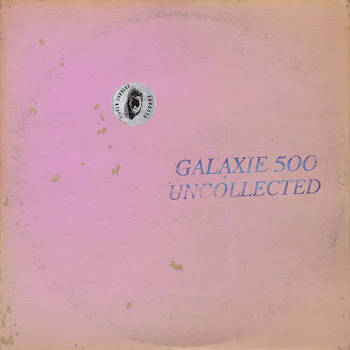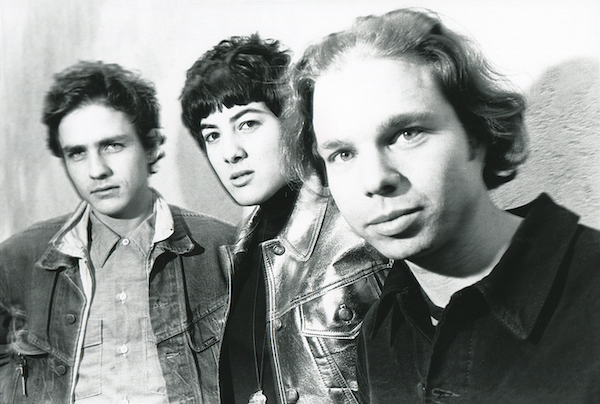Rock Album Review: Galaxie 500, “Uncollected New York Noise 1988-1990” — Expanding the Band’s Legacy
By Steve Erickson
Through it all, the members of Galaxie 500 have stayed true to the idea of “indie” as a personal and political vision rather than a mere genre tag.
Galaxie 500, Uncollected New York Noise 1988-1990
Available in digital media from 20/20/20 and vinyl, CD, and cassette from Silver Current Records
 As popular as the indie rock band Galaxie 500 were in the late ’80s, Uncollected New York Noise 1988-1990 is their first archival release since a 2005 compilation of British radio sessions. This 85-minute assortment of demos and B-sides display the full potential of the band’s guitar/bass/drums lineup, even in its scruffiest form: take “King of Spain,” where singer/guitarist Dean Wareham lays an extended solo over a jazzy rhythm section. Even though his guitar-playing owed a lot to Lou Reed, leading to constant comparisons to Velvet Underground, he put a much heavier emphasis on solos. Other models may come to mind — Television’s Richard Lloyd and Tom Verlaine, a touch of ’60s Bay Area psychedelia — but Wareham’s voice as a guitarist is immediately recognizable.
As popular as the indie rock band Galaxie 500 were in the late ’80s, Uncollected New York Noise 1988-1990 is their first archival release since a 2005 compilation of British radio sessions. This 85-minute assortment of demos and B-sides display the full potential of the band’s guitar/bass/drums lineup, even in its scruffiest form: take “King of Spain,” where singer/guitarist Dean Wareham lays an extended solo over a jazzy rhythm section. Even though his guitar-playing owed a lot to Lou Reed, leading to constant comparisons to Velvet Underground, he put a much heavier emphasis on solos. Other models may come to mind — Television’s Richard Lloyd and Tom Verlaine, a touch of ’60s Bay Area psychedelia — but Wareham’s voice as a guitarist is immediately recognizable.
The title of Uncollected New York Noise 1988-1990 refers to producer Mark Kramer’s studio, but it also references the band’s two homes in Boston and New York. (“Blue Thunder” pays tribute to Wareham’s car with the line “I was singing out on Route 128.”) Although Wareham, bassist Naomi Yang, and drummer Damon Krukowski first met in NYC, the band formed while they were Harvard University students. They played frequently in Boston in the late ’80s, putting out their debut single “Tugboat” and album Today on the local Aurora label.
Uncollected New York Noise 1988-1990 reveals some musical areas Galaxie 500 didn’t explore on their studio albums. The pace tends to be quicker, especially on the opening “Shout You Down.” (They rarely let a song run more than five minutes, but most could easily run much longer.) For a rock drummer, Krukowski placed unusual emphasis on his ride cymbals. In “Ceremony,” he refrains from hitting the snare as long as possible. Galaxie 500 didn’t write that song: it was the last one Joy Division singer Ian Curtis composed before his death. But its structure, driven by a sweeping tide of anguish as Wareham surveys a tangled, decaying relationship and capped by a lengthy solo, fits the band’s style.
Yang and Krukowski were capable of intense propulsion, but they tended to hold back. Unfortunately, the mix on Uncollected New York Noise 1988-1990 shortchanges Yang’s bass lines. Playing countermelodies to Wareham’s guitar, they were louder on the band’s studio albums. The rhythm section’s restraint gives their music a languid mood, which supported Wareham’s fluid leads. (Surveying the band for trouserpress.com, Michael Pietsch claimed they “made a virtue of lethargy.”) Although Galaxie 500 has been retrospectively labeled “dream pop,” hooks were never the emphasis of their songs.

Galaxie 500. Photo: Renaud Monfourny
Galaxie 500’s trio lineup contributed to the roughness of the demos included in Uncollected New York Noise 1988-1990. While Kramer played keyboards on their albums (his organ can be heard on the video mix of “Fourth of July”), this set is essentially a live performance preserved in the studio. (Ralph Carney’s overdubbed saxophone on “Blue Thunder” is a rare exception.) It’s assembled in chronological order, with the band taking a leap in confidence around the time of their second album, On Fire. The more polished production of their studio albums added layers to their music, allowing Wareham to play rhythm and lead guitar simultaneously. This set peels them back, allowing the individual parts to be heard more clearly.
All three members of Galaxie 500 went on to keep making exciting music: Yang and Krukowski together as a duo, Wareham as the singer of Luna. But Uncollected New York Noise 1988-1990 expands on a CD of rarities included in Galaxie 500’s 1996 box set. Eight previously unreleased songs have been added. Returning to its output suggests that the band is concerned with its legacy.
That legacy has become more political than one might expect from their lyrics (although “Shout You Down” was written about a 1983 protest against Caspar Weinberger, then Defense Secretary, at Harvard.) Krukowski has become a prominent voice against rip-off merchants like Spotify. Pursuing writing alongside music, he has penned two poetry collections, two books about music, and a popular, frequently updated Substack. Now a union organizer, his essays have laid out technology’s contribution to new forms of exploitation in the music industry. The band knew firsthand what it was like to be swindled; Rough Trade, which signed them in 1989 and issued their last two albums, shafted them by going bankrupt in 1991. (Today the label exists in a more stable form, under different ownership.) The Salem-based Rykodisc, the first label that reissued their work, also went under. Through it all, the members of Galaxie 500 have stayed true to the idea of “indie” as a personal and political vision rather than a mere genre tag.
Steve Erickson writes about film and music for Gay City News, Slant Magazine, the Nashville Scene, Trouser Press, and other outlets. He also produces electronic music under the tag callinamagician. His latest album, Bells and Whistles, was released in January 2024, and is available to stream here.
Tagged: Damon Krukowski, Dean Wareham, Galaxie 500, Naomi Yang, Silver Current Records
